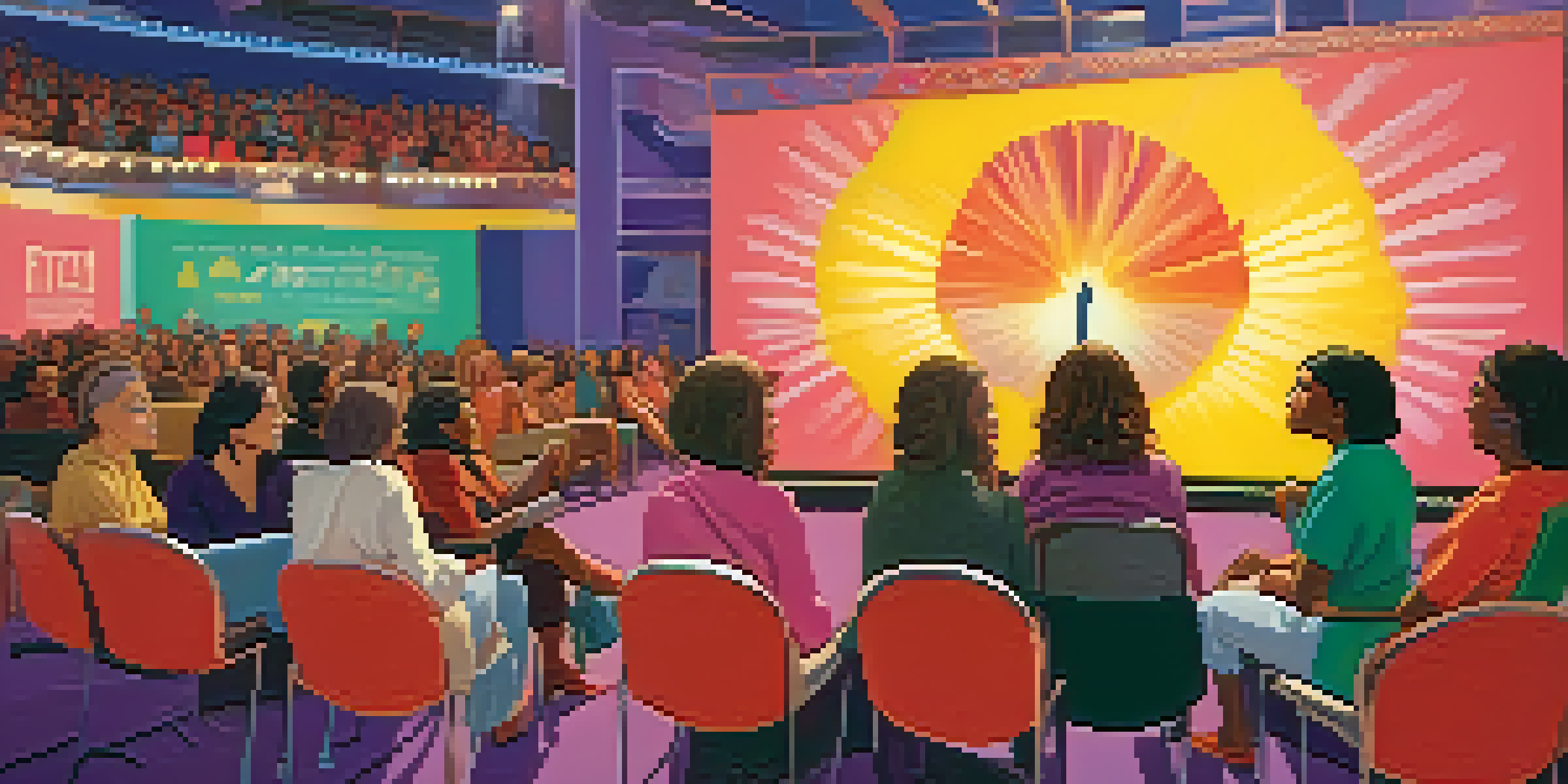The Feminist Movement: Films That Sparked Social Change

The Origins of Feminist Film and Its Impact
The feminist movement in cinema emerged as a response to the portrayal of women in traditional films, often relegated to supporting roles. Pioneering directors and writers began to challenge these stereotypes, creating narratives that centered women's experiences and struggles. Early films like 'Thelma & Louise' showcased female empowerment and friendship, serving as a rallying cry for audiences seeking representation. This shift not only influenced viewers but also inspired future filmmakers to explore complex female characters.
The feminist movement is not about women competing with men, but rather about women competing with women’s own expectations.
As these films gained popularity, they laid the groundwork for a broader conversation about gender equality in the film industry. They invited viewers to reflect on societal norms and the treatment of women in all aspects of life. Documentaries and narratives became powerful tools for advocacy, highlighting issues such as reproductive rights and workplace equality. The emergence of feminist film festivals further promoted these stories, creating a platform for diverse voices.
In this way, feminist films became catalysts for social change, sparking discussions that transcended the screen. They encouraged audiences to challenge the status quo and advocate for women's rights in their communities. As we delve deeper into specific films, it’s essential to recognize their role not just as entertainment, but as instruments of activism.
Key Films That Shaped the Feminist Discourse
Several films stand out as pivotal in shaping feminist discourse. For instance, 'A League of Their Own' broke barriers by showcasing women's contributions to sports during World War II, challenging the notion that athleticism is a male domain. This film not only entertained but also empowered women to embrace their passions, regardless of societal expectations. Its iconic line, 'There's no crying in baseball,' became a mantra for resilience and strength.

Another landmark film, 'The Color Purple,' brought to light the struggles faced by African American women in the early 20th century. Through its powerful storytelling and rich character development, it highlighted issues of race, gender, and abuse, urging audiences to confront uncomfortable truths. The film's emotional depth and authenticity resonated with many, fostering empathy and sparking conversations about intersectionality in feminism.
Feminist Films Spark Social Change
Films like 'Thelma & Louise' and 'A League of Their Own' challenge stereotypes and inspire discussions about gender equality.
These films, among others, served as mirrors reflecting the realities of women's lives, pushing boundaries and encouraging dialogue. They not only entertained but also educated audiences on important social issues. By examining these narratives, we can better understand how cinema has influenced perceptions of gender and inspired action.
Documentaries: Real Stories, Real Change
Documentaries have played a crucial role in the feminist movement by showcasing real stories that demand attention. Films like 'Miss Representation' explore the portrayal of women in media, revealing how these images shape societal attitudes and expectations. By presenting factual evidence and personal testimonies, these documentaries urge viewers to reevaluate the media's impact on women and girls. They serve as a wake-up call, highlighting the urgent need for change in representation.
Cinema is a mirror by which we often see ourselves.
Another powerful documentary, 'RBG,' chronicles the life of Ruth Bader Ginsburg and her tireless fight for gender equality. Through her story, the film illustrates the importance of perseverance in the face of adversity. It not only celebrates her achievements but also inspires a new generation to advocate for women's rights. This blend of storytelling and activism showcases how documentaries can educate and empower audiences.
The impact of these documentaries extends beyond the screen, fostering community engagement and advocacy. They encourage viewers to participate in discussions and movements aimed at promoting gender equality. By bringing real stories to light, these films remind us that the fight for women's rights is ongoing and needs collective action.
International Perspectives on Feminism in Film
Feminism is a global movement, and films from various cultures offer unique perspectives on women's issues. For example, 'Persepolis' uses animation to depict the life of a young girl in Iran during and after the Islamic Revolution. This poignant narrative highlights the challenges women face under oppressive regimes, making the personal political. The film resonates with audiences worldwide, emphasizing the universal quest for freedom and equality.
Similarly, 'The Breadwinner' tells the story of a young Afghan girl who disguises herself as a boy to support her family. This animated feature sheds light on the harsh realities faced by women in Afghanistan, showcasing their resilience and bravery. By presenting these stories, filmmakers foster empathy and understanding across cultures, bridging gaps and sparking conversations about global feminism.
Documentaries Drive Awareness
Documentaries such as 'Miss Representation' and 'RBG' highlight real stories that emphasize the need for change in women's representation.
These international films remind us that the feminist movement is not confined to one narrative or location. They illustrate the diverse experiences of women around the world, encouraging solidarity and support. By engaging with these stories, audiences can appreciate the complexity of feminism and the shared struggles for equality.
The Role of Film Festivals in Promoting Feminist Cinema
Film festivals have become vital platforms for promoting feminist cinema and amplifying underrepresented voices. Events like the Women’s Film Festival and the Black Women’s Film Network showcase films that challenge gender norms and highlight women's stories. These festivals create a space for filmmakers to share their work, fostering connections and collaboration within the industry. They celebrate diversity, ensuring that a wide range of experiences are represented on screen.
In addition to showcasing films, these festivals often host panels and discussions that delve into pressing issues in the industry. Topics may include gender disparity in film production, the importance of intersectionality, and strategies for supporting women filmmakers. By facilitating these conversations, festivals encourage audiences to engage critically with the films they watch and consider their implications.
Moreover, film festivals often attract media attention, amplifying the reach of feminist films beyond niche audiences. This exposure helps to drive conversations about gender equality in the broader cultural context. By supporting these events, audiences can contribute to the ongoing movement for representation and equity in cinema.
Challenges Facing Feminist Filmmakers Today
Despite the progress made in feminist filmmaking, challenges remain for women in the industry. Gender disparity in funding and distribution continues to be a significant barrier, with women filmmakers often receiving less support than their male counterparts. This inequity can limit the diversity of stories told and perpetuate stereotypes, making it crucial to advocate for equal opportunities. Recognizing these challenges is the first step toward fostering a more inclusive film industry.
Additionally, women filmmakers often face scrutiny and criticism that their male counterparts do not encounter. The pressure to succeed can be overwhelming, leading to self-doubt and burnout. This environment can discourage talented women from pursuing their passion, reinforcing the need for mentorship and support networks. Building a community of women filmmakers can help to uplift and empower each other in navigating these obstacles.
Global Perspectives on Feminism
International films like 'Persepolis' and 'The Breadwinner' showcase diverse women's experiences, fostering empathy and understanding across cultures.
Addressing these challenges requires collective action from industry stakeholders, audiences, and advocates. By supporting women-led projects and demanding equitable representation, we can contribute to a more balanced cinematic landscape. It’s essential to recognize that the fight for gender equality in film is ongoing and requires our continued commitment.
The Future of Feminist Film: What Lies Ahead
As we look to the future, the feminist film movement shows no signs of slowing down. With the rise of streaming platforms and digital media, opportunities for women filmmakers are expanding. This shift allows for more diverse stories to be told and for underrepresented voices to find their audience. The accessibility of technology empowers aspiring filmmakers to create and share their work, fostering innovation and creativity.
Furthermore, the increasing awareness of gender issues in the industry is driving change. Initiatives aimed at promoting women in film, such as the 50/50 by 2020 campaign, highlight the importance of equitable representation behind the camera. As more organizations advocate for gender parity, we can expect to see a lasting impact on the types of stories that are produced.

Ultimately, the future of feminist film is bright, as it continues to challenge norms and inspire social change. By supporting and amplifying women’s voices, we contribute to a more equitable and inclusive film landscape. As audiences, we play a crucial role in this movement, championing films that empower and educate, ensuring that the fight for equality remains at the forefront of cinema.